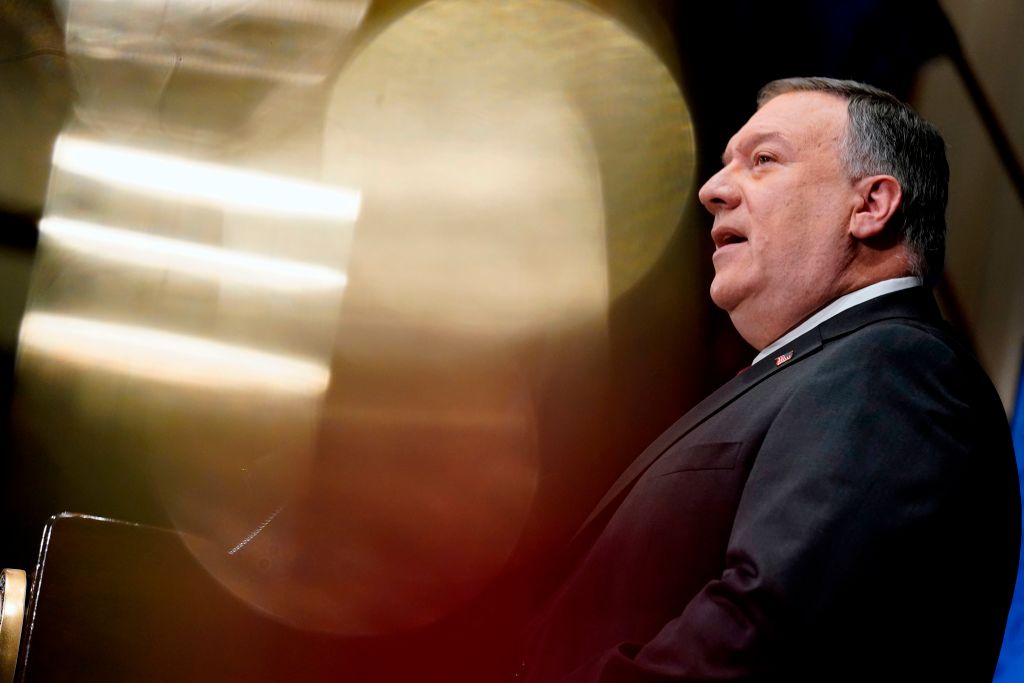Trump administration’s move to ease Taiwan restrictions a test for Biden
Posted By Mark Harrison on January 14, 2021 @ 12:45

On 9 January, US Secretary of State Mike Pompeo rescinded [1] a range of restrictions on US government interaction with the government of Taiwan. These restrictions had been in place, with periodic revisions, since the US established diplomatic relations with the People’s Republic of China in 1979. They proscribed certain meeting places (such as the White House and the State Department), precluded official attendance at Taiwan’s national day events on 10 October, required correspondence to pass through the US representative organisation the American Institute in Taiwan, barred the use of certain words (such as ‘government’ and ‘country’) to refer to Taiwan, and so on.
The circumstances of the late 1970s and early 1980s when the rules were established were very different to today’s. Taiwan, or the Republic of China, was still a military dictatorship under the KMT or Chinese Nationalists, whose claims to represent all of China had by then long been anachronistic and illegitimate. There was a generation of American policy leaders who were the architects of rapprochement with Beijing and were committed to Pax Americana in Northeast Asia. Their familiarity with the history and politics of modern China and the narrative of the civil war between the Nationalists under Chiang Kai-shek and the Communists under Mao Zedong meant they believed that peace and unification were coterminous. They had little knowledge of the history of Taiwan, including its Japanese colonial history and the failed 1947 anti-Chinese Nationalist uprising.
Today, Taiwan is democratic and the early movements for self-determination in the 1910s and 1920s under Japan have found party political representation. Beijing under Xi Jinping has sought to challenge the US-led regional order, and its model for unification [2], such as it is, is more about validating the ideology of the Chinese Communist Party than offering any viable roadmap that wouldn’t tip the region into chaos.
Many of the restrictions on US–Taiwan contacts had slipped by the wayside over the past several years and the Taiwan Assurance Act, which President Donald Trump signed into law in December, required their formal reassessment in any case. Pompeo’s statement was also calibrated, reading: ‘The United States government maintains relationships with unofficial partners around the world, and Taiwan is no exception.’ It stepped up to the boundaries of US–Taiwan relations but in using the word ‘unofficial’ didn’t step over them.
However, while the US move is explainable, it has occurred in the context of the crisis of US democracy and a febrile transition to a new presidency, and after nearly three years under a secretary of state characterised by notably hostile rhetoric towards Beijing. Washington is unstable and that affects the calculation of risk of any action in the Taiwan Strait.
One outcome of the decision is to present an early test for the incoming administration’s position towards Taiwan and China. President-elect Joe Biden could publicly walk back the action to signal a change of China policy or discretely affirm it and sidestep Beijing’s ire by ascribing responsibility to Trump. One can’t discount the partisanship of the outgoing administration wanting to present such a test and forestall the Biden administration’s time to calibrate foreign policy on its own terms.
At the same time, it does create options that the current administration’s unidirectional approach doesn’t have. Indeed, had the US government taken this action earlier, more clearly as part of its wide-ranging push-back against Beijing with months or years of escalation yet to run, it might have led to the most dangerous scenario of all—one in which Beijing concluded that it had run out of time on Taiwan and had to act. This is an indictment of the approach to China by the Trump administration but also a reminder that no US presidency functions separately from the governance structure of the US system and the policy resets presented by its democratic elections.
China’s state media was quick to vent fury at the US [3], while the Ministry of Foreign Affairs issued a strong but mostly boilerplate repudiation [4], falling short of some of the more alarmist analyses [5]. In Taipei, the government was in the awkward position of being delighted by the decision but also conscious of the chaos in Washington, a presidency without legitimacy, and the uncertainty over the Biden administration’s position. The Taiwan foreign ministry issued a statement [6] welcoming the decision but also noting the bipartisan support for the Taiwan Assurance Act that was its proximate trigger.
In Australia, the government is very unlikely to change the rules of interaction with Taiwan in response. Like the US, Australia has applied its own norms more flexibly in recent years, but, contrary to the view of a range of vocal commentators, the Australian government hasn’t been slavishly following the Trump administration in foreign policy. Australia–Taiwan relations are in a positive period, but Canberra has still declined to upgrade them with concrete actions despite entreaties from Taipei.
At a press conference in December, Prime Minister Scott Morrison referred to ‘Taiwan’ without a qualifier. However, at another press conference in January, Health Minister Greg Hunt returned to form and used the term ‘the jurisdiction of Taiwan’ [7], a phrase for which no precedent or rule exists but which no doubt satisfied Beijing. Like Beijing and Taipei, Canberra can only observe developments in Washington and wait and see—though, for the Taiwan Strait, that is never the worst outcome.
Article printed from The Strategist: https://www.aspistrategist.org.au
URL to article: https://www.aspistrategist.org.au/trump-administrations-move-to-ease-taiwan-restrictions-a-test-for-biden/
URLs in this post:
[1] rescinded: https://www.state.gov/lifting-self-imposed-restrictions-on-the-u-s-taiwan-relationship/
[2] model for unification: https://www.aspistrategist.org.au/taiwan-no-roadmap-to-unification/
[3] quick to vent fury at the US: https://www.globaltimes.cn/page/202101/1212370.shtml
[4] issued a strong but mostly boilerplate repudiation: https://www.fmprc.gov.cn/mfa_eng/xwfw_665399/s2510_665401/t1845634.shtml
[5] alarmist analyses: https://www.cnbc.com/2021/01/11/pompeo-is-laying-landmines-in-us-china-relations-for-the-biden-administration-says-e-australian.html
[6] issued a statement: https://twitter.com/MOFA_Taiwan/status/1348071102648512513?s=20
[7] used the term ‘the jurisdiction of Taiwan’: https://www.pm.gov.au/media/press-conference-australian-parliament-house-12
Click here to print.